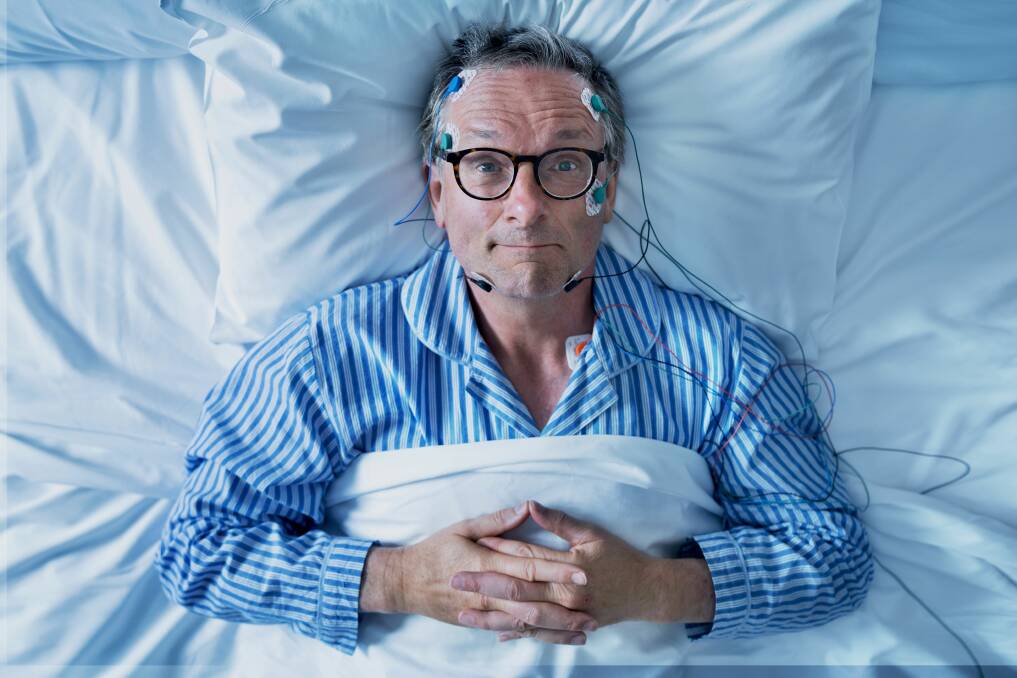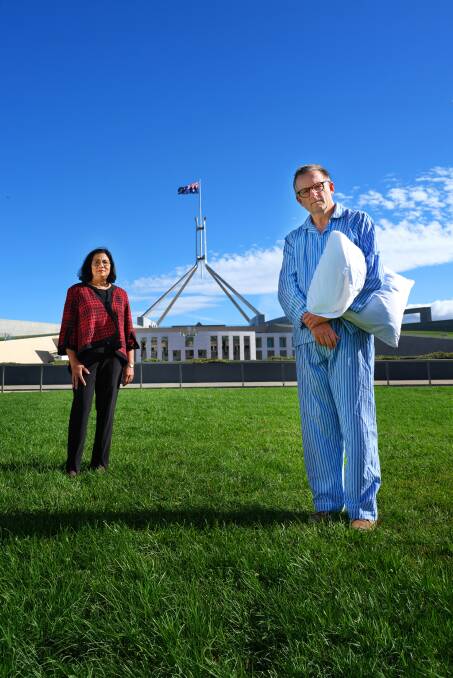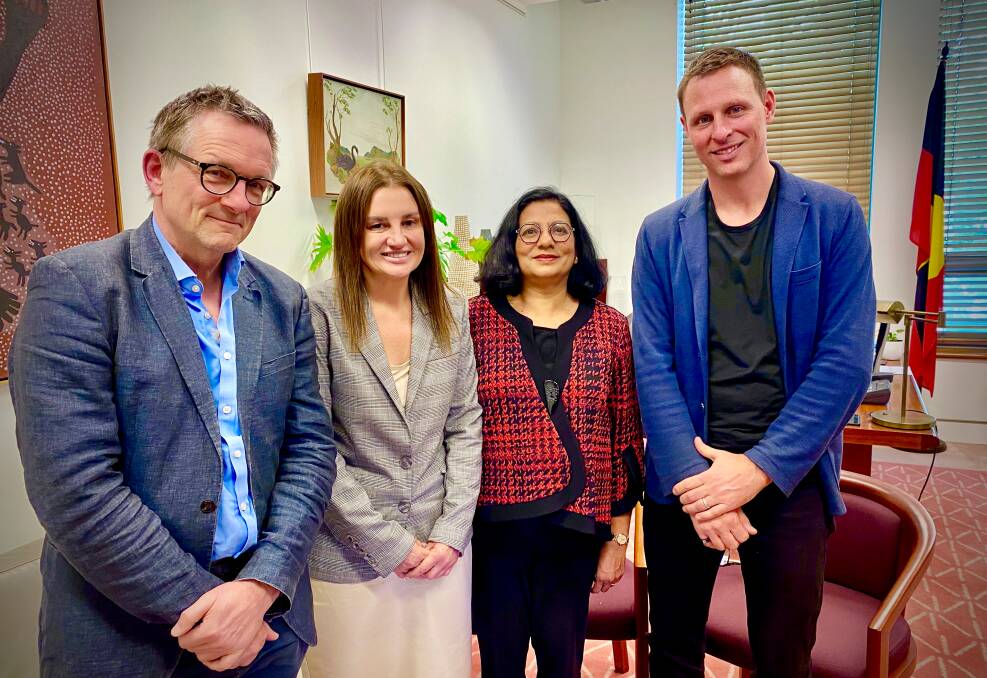It's just past 10pm in Buckinghamshire, England, and Michael Mosley is ready for bed. It's something he looks forward to now, after suffering from insomnia for most of his adult life. And we'll get to that.
Me, I feel like a fraud. Here, it's morning time. I check my sleep stats as soon as I wake up - when did we start doing that? - and how ironic on the night before I'm to interview Mosley about his ground-breaking sleep program, my results are "poor".
I slept long enough, seven-and-a-half hours, but not well enough to bring my stress levels down overnight. "You might feel higher stress or fatigue today." Not a great start to the day.
Why are we all dreaming of a good night's sleep?
"I think it's because people are much more aware of the problems associated with poor sleep and I also suspect that poor sleep is on the rise," Mosley says.
There was perhaps a time where, after a poor night's sleep, we'd just put up with being tired and think nothing more of it.
But recent research has shown too little sleep can devastate your body, brain and gut bacteria, or microbiome, dramatically increasing your risk of developing a range of chronic conditions such as obesity, type 2 diabetes and dementia.
And it's not just quantity, but quality, too. Extensive sleep studies have shown that if you don't get enough of the right sort of sleep, you increase your risk of depression and memory problems.

"Which is particularly worrying if, like a third of the adult population, you suffer from insomnia," Mosley says.
His SBS series Australia's Sleep Revolution, and the accompanying book Four Weeks to Better Sleep: A life-changing plan for deep sleep, improved brain function and feeling great, has taken the message from the bedrooms of ordinary Australians to the halls of Parliament House.
As well as an eight-week trial with 30 patients, in association with the Flinders University Sleep Institute, Mosley and his series co-host, sleep physician and advocate associate professor Sutapa Mukherjee, run a sleep trial on four politicians here in Canberra.
Barnaby Joyce, Jacqui Lambie, Josh Wilson and Mike Freelander are tracked over a hectic sitting week period and the results are, as Joyce says, "terrifying".
Mosley won't go as far as saying Joyce's recent behaviour is a result of his sleep habits, "but I think it's a big part of it ... he was certainly looking utterly shattered when I met him".
Mosley hopes the shock of it all might shake things up a bit. At the end of the trial, Joyce's blood pressure is dangerously high, he's told he has obstructive sleep apnoea and insomnia, or COMISA, and on any given night he stops breathing 30 to 40 times a night. He's told people with that combination tend to die early.
In 2019, the Bedtime Reading Report was tabled in Parliament. But it has since been largely ignored.
READ MORE:
At the end of the series, there's a note to say the government has responded to the inquiry; the majority of the 11 recommendations have been supported in principle and one has in part been actioned.
"I think, like a lot of us, they were in denial, but having these results put before them, absolutely did change their attitude," he says, "I was pleased to see Jacqui Lambie spring into action, she seems to be a force of nature."
He's optimistic changes will be made. In 2021, he took his Health Revolution, which focused on the prevalence of type 2 diabetes, to Parliament, and has seen recommendations put into place and government funding going into research.
Mosley isn't afraid to use himself as a guinea pig. The Health Revolution came out of his own diagnosis of type 2 diabetes in 2012. Over the years, he's swallowed tapeworms, infected himself with malaria, and gone caving even though he suffers from claustrophobia. He even volunteered for COVID vaccine trials early in the pandemic, and was disappointed when Oxford University, his alma mater, knocked him back.
For this sleep program, Mosley joined 30 other ordinary Australians, comedians, scientists, nursing students, parents, shift workers, each one of them struggling with poor sleep, for an intensive eight-week trial.
"I was diagnosed with sleep apnoea, I've been using the mouthguard with much success," he says of the "mandibular splint", a device which repositions the jaw, clearing airways to make breathing easier.
"Even on nights where I don't sleep that well, and they still occasionally happen, I actually feel a lot better the next day."
He's also been using light therapy to reset his circadian rhythms.
Meanwhile, 40 per cent of Australians are getting inadequate sleep.

Almost 90 per cent of patients presenting to their general practitioner with insomnia symptoms are prescribed sedative hypnotics, which can be addictive and ineffective in the long-term.
It's estimated about 80 per cent of people with sleep apnoea aren't diagnosed.
Mosley gets emotional when he realises his late father, who died when he was 72, was probably one of those undiagnosed sufferers.
"One of the joys of doing this series is that we really changed the lives of those involved," he says. By the end of the trial, 80 per cent had been treated successfully and had their conditions under control.
Mosley said it's clear to him now that there has to be a multi-pronged approach to solving sleep issues.
He doesn't blame GPs for relying on drugs, recognising they're not trained to delve that deep. He realises too that not everyone has access to trials and technology.
Which is where the book might come in handy.
It's a four-week plan, based on the latest science, designed to help you re-establish healthy sleeping patterns.
"No book can hope to replicate what the Flinders' team managed to achieve, and if you have severe sleep problems then I would strongly recommend that you try to get referred to a sleep specialist," he says.
"That said, I am hopeful that if you follow the advice in the book it will make a significant difference to how well you sleep."
He talks about the science of sleep, how we sleep, what keeps us awake, whether we're getting enough sleep for the different life stages, the importance of diet, and gives us some interesting research into sleep deprivation before moving on to tried and tested ways of improving sleep.
"A simple place to start is to look at sleep like a habit," he says.
"There is no one size fits all solution ... but all the experts I've spoken to are passionate about the importance of treating sleep like a habit, one that you can improve with practice, and they all agree that getting into a regular wake-up-go-to-bed routine is a good starting point."

One of his top tips is to clear out the bedroom junk.
"Your bedroom should be for sleep and sex and nothing else," he says. "If you have a television in the bedroom, or you take your phone to bed with you, the temptation will be to use them."
He has his phone in his bedroom but on a shelf away from his bed. It means when his alarm goes off in the morning, he has to get out of bed to turn it off. It's a double win.
Your wind-down routine should start three hours before you plan to go to sleep.
One tip is to stop eating. He's a firm advocate of Time Restricted Eating, of being able to reset the gut biome. There's a whole chapter on Eating Your Way to a Good Night's Sleep. Does turkey make you sleepy, does eating cheese before bed give you nightmares? Is the Mediterranean Diet the solution?
The book also contains recipes from Mosley's wife and Fast 800 co-author Clare Bailey. She's a GP who has seen success in her own patients who have switched to a moderately low-carb, high-fibre Mediterranean diet.
Part two of the book is the four-week plan, it involves such things as keeping a sleep diary, changing diet, practising deep breathing exercises as well as some resistance training.
It also explains sleep restriction therapy, where you track how long you're asleep for in week one, and then in following weeks, only stay in bed for that allotted period. In the Flinders University trials, several of the patients underwent this treatment with much success.
Mosley realises a personalised sleep solution might be hard to find, and that chronic sufferers will need to do more than sleep in a quiet dark room.
"It's like telling people who need to lose weight to eat less and move more, it's sort of useful, but also completely useless," he says.
"What I hoped to do with both the series and the book is to put the science-based stuff out there, to let people know there could be an answer to their problem.
"I think there is a big sleep revolution on the way and the use of technology can certainly help but it's about disseminating the information we already know and we know so much more than we used to.
"One hundred years ago most people thought that the brain simply switched off, like a light bulb, when you went to sleep."
He quotes Thomas Edison, manufacturer of the first lightbulbs, who said, "Most people overeat 100 per cent and over-sleep 100 per cent, because they like it. That extra 100 per cent makes them unhealthy and inefficient."
"Ironic that Edison's invention, the lightbulb, did more to disrupt our sleeping patterns than any other."
And with that, I let him switch off the lights and head to bed.
- Australia's Sleep Revolution with Dr Michael Mosley is available to stream free on SBS On Demand.
- Four weeks to better sleep: A life-changing plan for deep sleep, improved brain function and feeling great, by Dr Michael Mosley. Simon and Schuster. $34.99.


